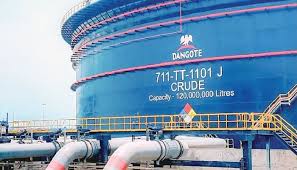Nigeria’s Dangote Petroleum Refinery has concluded plans to construct major fuel storage tanks in Walvis Bay, Namibia, as part of its move to expand refined fuel supply to Southern Africa. According to two sources familiar with the development, the facility will hold at least 1.6 million barrels of gasoline and diesel, targeting key regional markets including Namibia, Botswana, Zambia, Zimbabwe, and parts of the Democratic Republic of Congo.
The decision marks a significant step in Dangote Refinery’s ambition to not only secure Nigeria’s domestic fuel market but to dominate Africa’s downstream petroleum sector and change regional trade flows. The refinery, which has a processing capacity of 650,000 barrels per day (bpd), is one of the largest in the world and the biggest in Africa. It was developed at a cost of $20 billion by Africa’s richest man, Aliko Dangote, and began operations in 2024.
According to insiders who spoke to Reuters, construction work on the storage tanks is expected to begin soon within the Walvis Bay port. Although the total cost of the new facility has not been disclosed, its scale suggests a significant investment in infrastructure aimed at ensuring steady regional supply.
A senior official at the Namibia Ports Authority confirmed the development and stated that the tanks would be housed inside Walvis Bay Harbour, a strategic logistics point for southern Africa. The harbour already serves as a critical entry point for petroleum imports into landlocked countries like Zambia and Botswana.
The refinery’s expansion into southern Africa comes amid growing demand for stable and affordable refined petroleum products across the continent. For years, most African countries have relied heavily on fuel imports from Europe and the Middle East, exposing their markets to global price fluctuations, logistical delays, and foreign exchange pressures.
With Nigeria now significantly reducing fuel imports due to Dangote’s local refining output, the refinery is looking to export excess products to new regional markets. The planned Namibian storage facility will allow the refinery to distribute gasoline and diesel more efficiently within the southern African corridor.
The development also coincides with reports that Dangote recently shipped its first petrol cargo to Asia, signalling the refinery’s readiness to serve global markets. If successful, the project will position Dangote as a major player not just in Nigeria’s oil sector, but in the continental and global refined petroleum markets.
A Dangote Group spokesperson did not respond to requests for comments regarding the Namibia project. However, analysts say the move aligns with the refinery’s broader strategy to secure export hubs across Africa, with potential for similar facilities in East Africa in the future.
Energy analysts believe the project could boost fuel access and affordability across the Southern African Development Community (SADC) region, particularly in areas where local refineries are struggling or non-existent. Countries like Zimbabwe and Zambia, for instance, have faced periodic fuel shortages due to logistics and forex constraints.
Dangote Refinery’s export model is expected to include both bulk distribution and direct delivery to national fuel companies, depending on individual country agreements. By building storage infrastructure in strategic locations, the refinery can bypass the delays and costs associated with third-party ports and import logistics.
When operating at full capacity, Dangote Refinery says it will be able to meet all of Nigeria’s domestic fuel demand—which until recently relied entirely on imports—and export surplus to the rest of Africa. The refinery’s product mix includes petrol, diesel, aviation fuel, and liquefied petroleum gas (LPG), with a focus on achieving global standards.
The latest development could also strengthen trade ties between Nigeria and Southern African countries, while showcasing the potential for intra-African trade under the African Continental Free Trade Area (AfCFTA).
If completed as planned, the Namibia fuel storage tanks will represent a major boost for regional energy security, and serve as a critical logistics hub to support growing fuel demands across the southern corridor.
